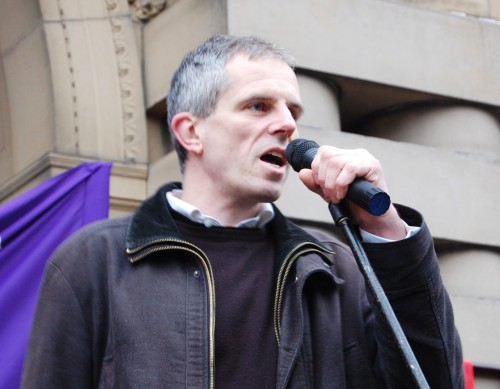Sheffield’s Green Party Councillors have thrown their weight behind a call to improve the way the Council works. Thousands of Sheffielders have said they don’t want buildings on Devonshire Street to be knocked down or street trees destroyed. In Walkley, many have stood up against the sell-off of the Carnegie Library.
That this Council:-
(a) believes that the problems with the Strong Leader and Cabinet/Executive system are:-
(i) the fact that the ‘Cabinet’ (or ‘Executive’) can be composed exclusively of members from one political party;
(ii) the fact that the leader has such a monopoly of power;
(iii) the fact that members of the Cabinet/Executive are chosen by the Leader;
(iv) the fact that the Cabinet/Executive is often not geographically representative;
(v) the lack of genuine debate at Cabinet/Executive meetings, with most decisions being taken in advance;
(vi) the under-utilisation and marginalisation of backbench Councillors;
(vii) the lack of opportunities for backbench Councillors to build up expertise;
(viii) the fact that residents do not have equality of representation – those residents with a Councillor who is a Cabinet (or Executive) Member have a Councillor with more influence than those residents with non-Cabinet (or Executive) Councillors, although this can cut both ways if a Cabinet/Executive Councillor uses their position on the Cabinet/Executive to excuse them from engaging in local issues;
(ix) backbench Councillors have little incentive to engage actively with their residents as they have little, or no, influence in the decision-making process; and (Green Party Councillors did not support this clause)
(x) the ‘strong leader’ model personalises local politics in an unhealthy way;
(b) believes that the problems with Councillors are:-
(i) that Councillors are not sufficiently representative of the community as a whole;
(ii) that too many Councillors fail to actively engage with the residents in their wards;
(iii) that too many Councillors fail to seek out and represent the concerns of their residents;
(iv) that too many Councillors fail to alert their residents in advance to forthcoming issues of potential importance; and
(v) that too few Councillors have the courage of their convictions to speak out when their party is taking a position which they personally are uncomfortable with;
(c) believes that the problems with party politics at the local level are:-
(i) that too many decisions are taken along party political lines, when party politics is actually irrelevant to the issue at hand;
(ii) that there are too many angry exchanges of abuse between members of the political parties, which undermine rational debate;
(iii) that it is difficult for residents to stand as independent Councillors, because they have no support structure; and
(iv) that party politics at the local level leads to polarised debates and a lack of consensus-building;
(d) believes that the problems which residents face in trying to influence the decisions which affect them are:-
(i) that residents are often not aware of decisions which will affect them or their community until the decision has already been made, and this gives residents the impression that everything is a ‘fait accompli’;
(ii) that where consultation does take place, it is often too late in the decision-making process to make any real difference;
(iii) that consultation exercises often appear weighted in favour of the Council’s preferred option; and
(iv) that the Council’s interpretation of the results of consultation exercises appears at times to manipulate respondents’ viewpoints to justify a pre-determined Council goal;
(e) believes that the problems with encouraging public engagement are:-
(i) that many residents feel a general sense of political apathy and are not interested in becoming engaged at the local level;
(ii) that many residents feel resentful about the way in which decisions have been made locally and do not trust the Council’s intentions;
(iii) that many residents feel that their Councillors are powerless to represent them;
(iv) that many residents have no contact with their Councillors at all;
(v) that many residents do not have the confidence or the knowledge to engage with the Council;
(vi) that many residents have never been to a Council meeting and would not know when or where they take place;
(vii) that many residents feel that the Council simply doesn’t listen or even care what they think;
(viii) that many residents are not part of an active residents’ association, and feel that their voice will simply not be heard; and
(ix) that there is a general failing to engage young people in the political process, and schools too often see politics as ‘dirty’!;
(f) believes that the long-term running down of local government is due to:-
(i) the fact that local government is starved of funding;
(ii) the fact that the Government uses ‘carrots and sticks’ to persuade and force local councils to fulfil its own goals;
(iii) the fact that decision-making is increasingly centralised – in spite of the provisions of the Localism Act; and
(iv) the fact that the local council doesn’t have sufficient officers or the resources to prioritise the adoption of a pro-active approach to engaging with local people; and
(g) believes that the committee system provides a more democratic form of governance for local authorities, and therefore requests that the necessary steps be taken for this Council to change its governance arrangements to the committee system.

